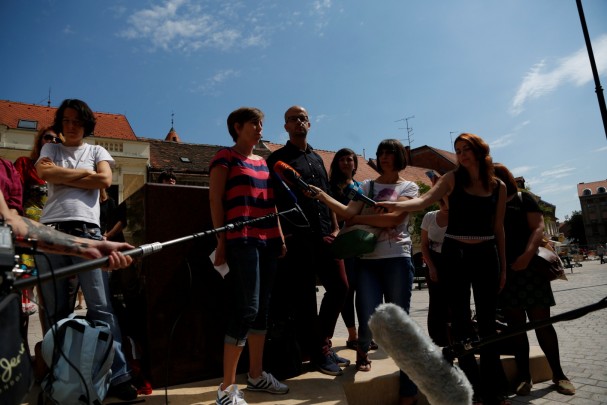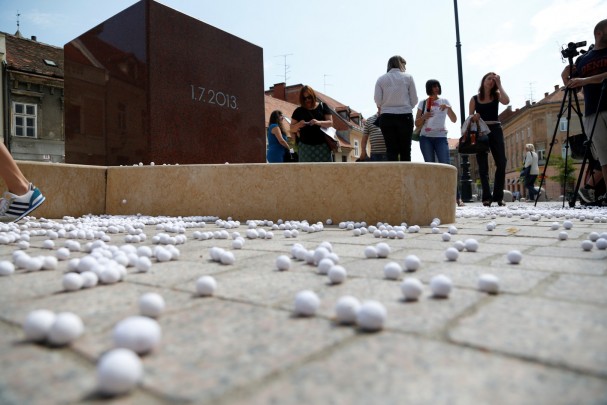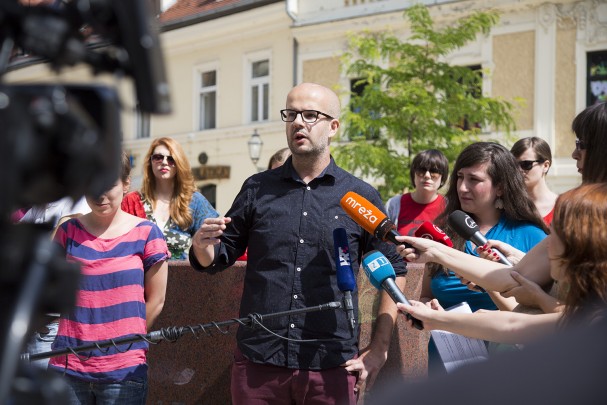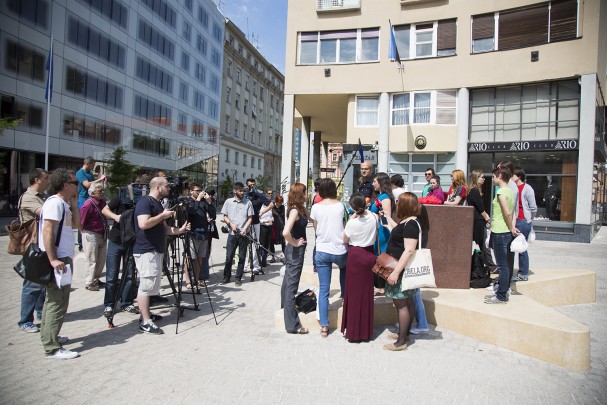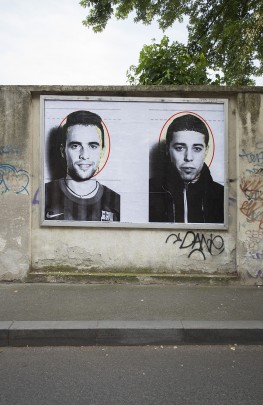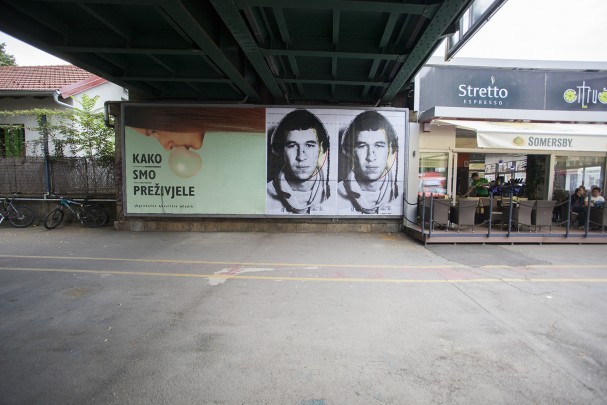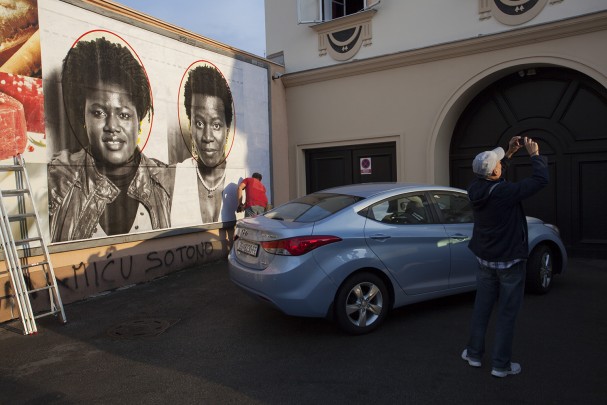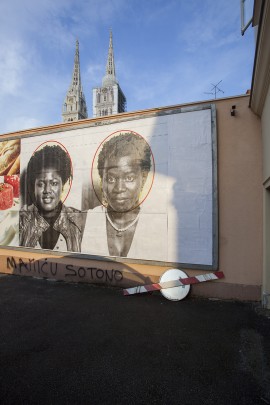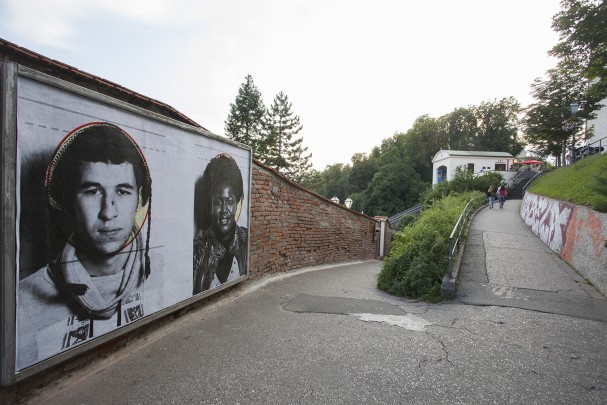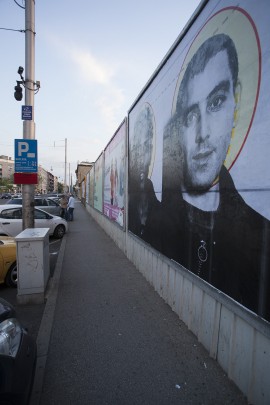Square of Europe: Blind Spot
Davor Konjikušić
The intervention is a result of my work on the project called Holy Men.
The starting point is the official “Template for Checking the Validity of Biometric Photographs,” which has been imposed on the photographers’ studios by the Ministry of the Interior with Croatia’s entry to the European Union. Following the instructions given there, I produce photographic portraits of asylum seekers, consciously making mistakes. Allowing for a minimum of facial expression revealing their personality, I refuse to deprive them of all individual traits or reduce them to archival data. By altering the power relations, I explore the role of the photographic medium as a political instrument of control and surveillance.
By exhibiting the photographed faces of asylum seekers in public space, which I consider to be the place where social antagonisms come to the fore most clearly, I want to make the immigrants visible at least on the symbolic level. I raise the question of their status and position, and in a wider context of the restrictive immigrant policy of the EU and the relationship between the European centre and the European periphery in which we live. I am building up my installation on the site of the future Europe Square, which I experience as a neuralgic spot in Zagreb’s urban space. The square is experienced as a site of power, which makes visible the coexistence of the power of private capital and the European institutions, whereas its public function remains on the purely declarative level.
BLOK’s statement to the press conference on the occasion of World Refugee Day:
“The newly created square of Zagreb, the so-called Square of Europe, was supposed to become, on the 20 June, World Refugee Day, the site of Konjikušić’s photo-installation, consisting of series of portraits of migrants framed with red and yellow lines taken from the official template for biometric passports, which those photographed will probably never own. But the idea to face the headquarters of European institutions in Croatia with the portraits of migrants was prevented by the Zagreb City administration which refused to issue the permission, stating that the space is reserved for city events, or, as we were told, that it is still a construction site. None of this prevented them to issue permission to the EU Commission for the celebration of Europe Day or to a nearby bar to install a terrace. Therefore it is clear that Zagreb maybe got a new square, but not a new public space – this is an exclusive space for the political and economic elites – the European Commission and occupants of luxury apartments in the rest of the Ban Center building. The Square of Europe does not leave space for deprivileged – this time these are migrants, next time it’ll be the poor, unemployed, abandoned and ill. Therefore Konjikušić’s work opens up questions of common interest, and we consider, as an organization which deals with public space for 14 years, that the questions of migrants’ politics should be dealt with even at this site, precisely at this site. Although we have displaced the portraits of migrants from the Square and dispersed them on 7 locations throughout the city, we consider that the migrants’ issues belong here. Asylum seekers and those who manage to attain it are confronted with a series of problems. Talking with asylum seekers here in Zagreb we found out that their biggest problem is the long duration of the process of attaining asylum: the longest duration is two years and two months, i.e. 26 months, i.e. 691 day. But that’s not the only case – average time of waiting is 10 months – 305 days.”
Davor Konjikušić was born in Zenica (Bosnia and Herzegovina) in 1979 and is about to defend his MA thesis at the Academy of Dramatic Art in Zagreb, where he has also completed his BA studies as cameraman. His work uses photography as a primary medium in articulating his artistic concept, in which he explores the relationships between public and private, intimate and socio-political.
In his artistic practice, Konjikušić has been combining photography with text, archive, found objects, and video. He has been interested in the role of the photographic medium in establishing the relations of power and control. His artwork Genogram has been awarded in the category of artistic concept at Rovinj Photodays 2013.
